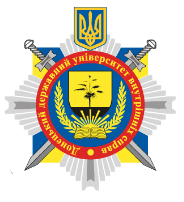ОСОБЛИВОСТІ ПРОФЕСІЙНОЇ ЕТИКИ СПІВРОБІТНИКІВ ПРАВООХОРОННИХ ОРГАНІВ
DOI:
https://doi.org/10.32782/2709-9261-2023-2-6-15Ключові слова:
правоохоронна діяльність, правоохоронні органи, професійна етика, професійна відповідальністьАнотація
Статтю присвячено дослідженню особливостей професійної етики співробітників правоохоронних органів. З’ясовано значення професійної етики для здійснення правоохоронної діяльності. Визначено ознаки правоохоронної діяльності та їх вплив на специфіку професійної етики правоохоронців. Сформульовано поняття та характерні риси професійної етики співробітників правоохоронних органів. Окреслено науково обґрунтовані пропозиції щодо вдосконалення правового регулювання професійної етики співробітників правоохоронних органів.
Посилання
Бесчастний В.М., Кононенко Т.В., Сабельникова Т.М. Етикет і професійна етика поліцейського. Київ : ВД Дакор, 2019. 216 с.
Лозовой В.О., Петришин О.В. Професійна етика юриста. Харків : Право, 2004. 176 с.
Середа О.Г., Свічкарьова Я.В. Основні аспекти деонтологічних засад правоохоронної діяльності. Наукові записки. Серія «Право». 2022. Вип. 13. С. 6–9.
Сущенко В.М. Модель професійної культури правника: критерії та підходи. Наукові записки НаУКМА. Серія «Юридичні науки». 2009. Вип. 90. С. 29–33.
Ярошенко О.М., Луценко О.Є. Професійна відповідальність правника : навч. посіб. Харків : Нац. юрид. ун-т імені Ярослава Мудрого, 2022. 174 с.
Goldstein D.B. Employee assistance for law enforcement: A brief review. J Police Crim Psych. 2006. № 21. P. 33–40. URL: https://doi.org/10.1007/BF02849500
Pollock J.M., Reynolds P.D. Ethics and law enforcement. Critical issues in policing: Contemporary readings. 2015. Р. 183–215.
Chambliss E. Professional Responsibility: Lawyers, A Case Study. Fordham L. Rev. 2000. Т. 69. P. 817–834.
Intro to the American Criminal Justice System. URL: http://www.correctionalofficer.org/us-criminal-justice-system
Law Enforcement Code of Ethics adopted at the 64th Annual IACP Conference and Exposition in October 1957. URL: https://www.theiacp.org/resources/law-enforcement-code-of-ethics





